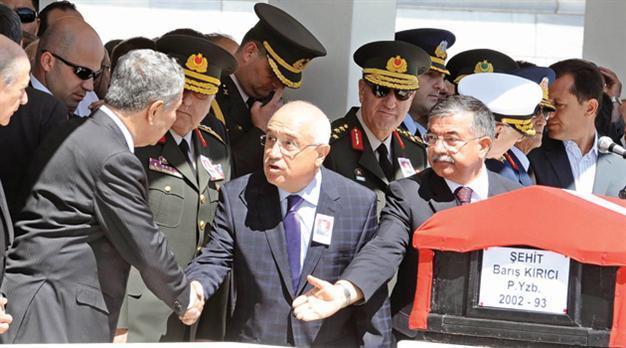Çiçek’s roadmap gets cold shoulder from AKP officials
ANKARA - Hürriyet Daily News

Deputy PM Bülent Arınç ( 2nd L) and Parliament Speaker Cemil Çiçek (2nd R) met warmly at a funeral ceremony held for Lt. Barış Kırıcı yesterday in Ankara. DAILY NEWS photo, Selahattin SÖNMEZ
Both government spokesperson Bülent Arınç and ruling Justice and Development Party (AKP) spokesperson Hüseyin Çelik took pains yesterday not to use any hurtful phrases against Parliament Speaker Cemil Çiçek, a former veteran member of the AKP government, while criticizing his call for parties to gather together to take action against terrorism.Still, both Arınç and Çelik made it clear that they do not approve of Çiçek’s call on political parties and civil society organizations, delivered in an 11-article written statement titled “National Consensus against Terror,” in which he emphasized the need to rush the democratization process in order to bring security-oriented measures to bear against the problem of terrorism.
Speaking to reporters, Deputy Prime Minister Arınç insisted that he, as the government’s spokesperson, was not the addressee of Çiçek’s recent call. Political parties and civil society organizations are the call’s intended audience, as mentioned in the text, and AKP executives may respond to this call if they wish, he said. Turkish public opinion should get over its habit of regarding the word “memorandum” as a purely military phrase, and instead should use the civilian meaning of the phrase, as a synonym for “reminder,” Arınç said.
“Why do people remember the events of March 12 [the 1971 military coup d’état], before the AKP [came to power], or the words of the chief of General Staff or other commanders of the Armed Forces: ‘watch your step Government! Resign,’ rather than considering richness of wording. [The word] has a civilian meaning too, doesn’t it? The civilian meaning of ‘memorandum’ is ‘reminder.’ … Çeçik is the speaker of parliament, which was elected by the people’s will. Of course he knows that there is no political meaning when [I] use the word ‘memorandum’ in a context referencing him, because he also adds richness to Turkish when he speaks. The speaker is not a stranger, he is a founder of our party.
He has taken charge in the Cabinet in every government cycle, and he is doing his job perfectly as parliament speaker. Beyond our personal fondness, no one can say that we do not have same ideas, opinons and discipline,” Arınç said. “The speaker did this: He made a consensus declaration. I would like to draw this parallel with a written letter: There is a written letter, but who will receive the letter? There must be an envelope, and there must be a receiving address written on the envelope in order to send it.”
Later in the day, Arınç and Çiçek met warmly at a funeral ceremony held for Lt. Barış Kırıcı, who died after having survived a helicopter crash on July 22.
Later in the afternoon, it was AKP deputy chair and spokesperson Hüseyin Çelik’s turn to comment on the issue, speaking at a press conference following meetings of the party’s Central Executive Board (MYK) and Central Decision and Executive Board (MKYK).
“Our parliament speaker has issued an 11-article statement. The Turkish Parliament is the place where the national will is made manifest. It is something to be heeded, if he makes a declaration of intent on his own behalf. He said ‘I made a statement like this under the title of Citizen Cemil Çiçek,’” Çelik said. “We might have wished that he would make this [statement] on such an important matter, and which advises meeting together to discuss sensitive issues jointly, [together] with the deputy chairs of the parliamentary groups,” he said. “As for its origin, this offer is well meant, and it is extremely meaningful that everyone should have a common attitude against terrorism, but I should say that this offer also includes some problematic parts in terms of the method and procedure it recommends.”
Irony of fate
Ironically, the AKP government’s response to the well-known military memorandum issued on April 27, 2007 against current President Abdullah Gül’s candidacy for presidency was read out by then-government spokesperson Çiçek.
The General Staff had posted a midnight memorandum against the government on its website on April 27, 2007, during the presidential election. Çiçek had read out the response on April 28, 2007.
















